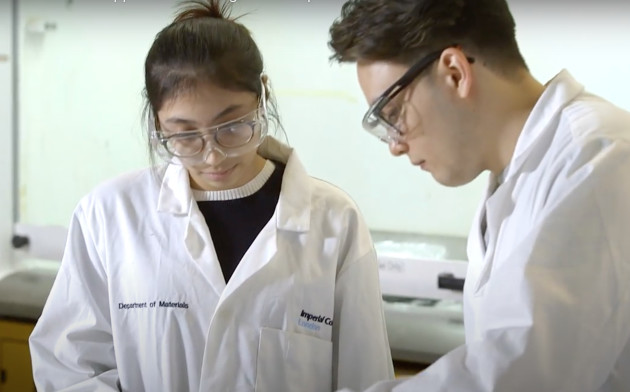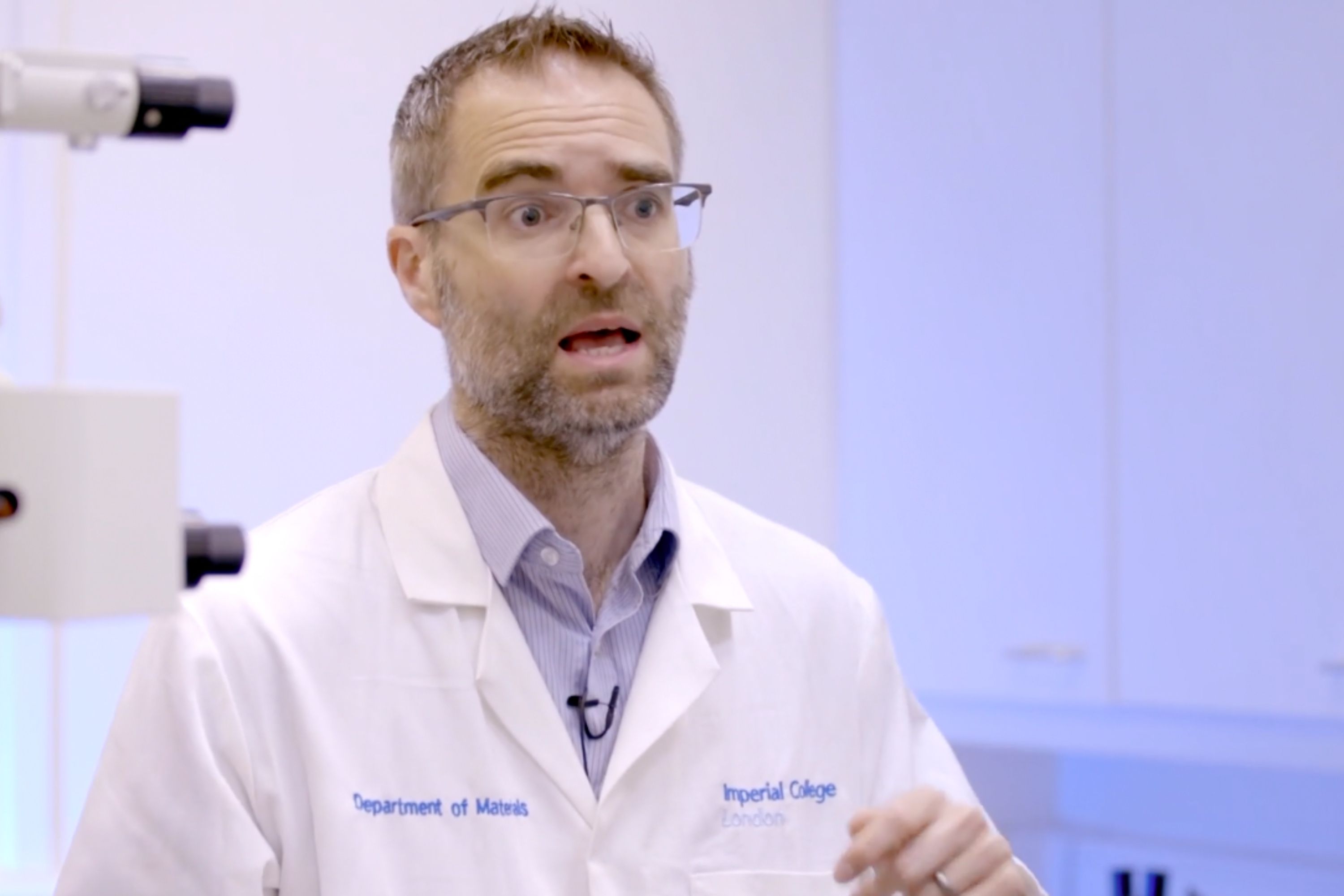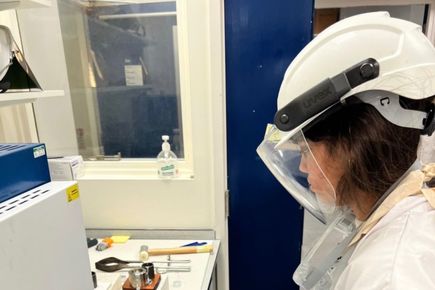Why study our MEng Materials Science and Engineering with Nuclear?
A degree from Imperial College London is highly valued by employers across the globe.
- The Department of Materials is ranked 2nd in the UK for Materials Technology (The Times Good University Guide 2024)
- Imperial College London is ranked 2nd in the world and 1st in the UK and Europe (QS World Rankings for 2025)
- Imperial College London is the University of the Year for Graduate Employment (The Times and Sunday Times Good University Guide 2024)
Below, we have listed reasons why you should study Materials Science at Imperial College, including our flagship Undergraduate Research Opportunity Programme, our hands-on practical modules, and the flexibility to tailor your degree.
Reasons to study Materials Science at Imperial College London
The following four reasons are unique to Imperial Materials.
1. Engineering Practice I & II – Our students complete hands-on practical modules, working in teams from day 1 of their degree course. Students in year 1 have to problem solve, design, manufacture, assemble and automate a solution to an engineering challenge. In year 2, they dismantle a given common product, characterise the materials and determine the production processes used and justify the economics behind the materials selection.
2. UROP – Our Undergraduate Research Opportunity Programme is a flagship of Imperial.
 Students from any year group can take part in research projects based at Imperial, with many sponsored by our industrial partners. Learn more about our Undergraduate Placement Opportunities.
Students from any year group can take part in research projects based at Imperial, with many sponsored by our industrial partners. Learn more about our Undergraduate Placement Opportunities.
3. Breadth of Materials – Our Materials courses cover a broad breadth of different classes of materials for various applications – with expert teaching from within the faculty. Find out more about our research.
4. Centres of Excellence – Academic staff from the Department of Materials are actively involved in many of the multidisciplinary Centres of Excellence.
Examples are Energy Futures Lab, Grantham Institute – Climate Change and the Environment, London Centre for Nanotechnology, Thomas Young Centre – The London Centre for Theory and Simulation of Materials, The Centre for Nuclear Engineering and The Composites Centre among many others. Shell-Imperial Advanced Interfacial Materials Science (AIMS) Centre, The Rolls-Royce Nuclear University Technology Centre, BP International Centre for Advanced Materials and the Imperial Centre for Quantum Engineering, Science and Technology are examples of strong industrial partnerships.
- Reputation, Ranking and Accreditation
 Our Materials Department consistently ranks highly in the world. We are ranked 2nd in the UK for Materials Technology by the Good University Guide 2023.
Our Materials Department consistently ranks highly in the world. We are ranked 2nd in the UK for Materials Technology by the Good University Guide 2023.
All our courses are accredited by the Institute of Materials, Minerals and Mining (IOM3) on behalf of the Engineering Council to fully meet the educational requirement for registration as an Incorporated Engineer and partially meet the academic requirement for registration as a Chartered Engineer.
- Teaching and Learning
The Teaching Excellence Framework is intended to ‘recognise and reward excellent learning and teaching’ in British universities. The Excellence Framework (TEF) awarded Imperial College London the Gold award.

Imperial’s TEF Gold ranking was rationalised for four main reasons:
- Creation of an ‘exceptionally stimulating and stretching’ education that challenges students to fulfil their potential
- Development of a ‘range of ways in which students are exposed to and deeply engaged with r
- Maintenance of an ‘outstanding learning environment that supports learning.’
- Embedding a ‘culture of student engagement and active philosophy of students as partners’.
- Industry Partnership and Graduate Employability
The Department of Materials has a strong track record of collaborating with industry and external partners in various sectors. For example, Shell-Imperial Advanced Interfacial Materials Science (AIMS) Centre, the Rolls-Royce Nuclear University Technology Centre and BP International Centre for Advanced Materials.
-
Research
The College ranks top in the UK overall – with a greater proportion of 4* “world-leading” research than any other UK university. In addition, Imperial ranks first in the UK for research outputs, first in the UK for research environment, and first for research impact among Russell Group universities.
The Department is at the forefront of materials research and innovation. Our staff are involved in various interdisciplinary initiatives and Research Centres, and we have a history of commercialising our innovative ideas. Undergraduate students can also develop personally and professionally by completing an Undergraduate Research Opportunity Programme.
- Entrepreneurship
We have some of the best-resourced entrepreneurship facilities in the country, including the largest mentoring system and a network of prototyping equipment. So if you're looking to bring an idea to life, there's no better place to do it. - Location
 Based in South Kensington, in central London, we are at the heart of one of the most exciting cities in the world – ps, shopping, bars, restaurants and clubs surround you. There are also festivals, street-food markets and historical landmarks which make London a unique city to explore. You can apply to live in one of our accommodation halls in the centre of London.
Based in South Kensington, in central London, we are at the heart of one of the most exciting cities in the world – ps, shopping, bars, restaurants and clubs surround you. There are also festivals, street-food markets and historical landmarks which make London a unique city to explore. You can apply to live in one of our accommodation halls in the centre of London.
- Tailor-make your degree
In the third year, you can select electives that map to the Department’s research themes and allow you to study a particular class of material or an underpinning principle in more detail. You will also broaden your educational experience by taking an I-explore module.
In your 4th year, you will undertake an individual research project with one of the Department’s research groups. This may involve working at an external facility such as Diamond in Oxfordshire or a laboratory overseas, e.g. MIT in the US. Project students work alongside researchers, including world-leading academics and PhD students, in areas from bone regeneration to aircraft landing gear and solar cells to cement-bonded refractories.
Imperial also offers a wide range of courses to stimulate your personal, professional and intellectual growth via Imperial Horizons, Imperial’s flagship Centre for Languages, Culture & Communication.
For more information, please visit the Why Imperial? webpage.



